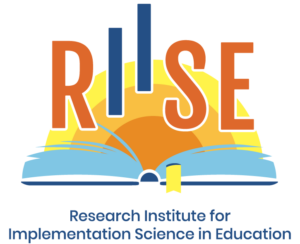| Core Faculty attend and lead the week-long June Institute. | Meet our Core Faculty here. |
2023 Cohort of Fellows
 |
Sonia Cabell, Ph.D., is an Associate Professor in the School of Teacher Education and the Florida Center for Reading Research at Florida State University. Her research seeks to better understand how to strengthen early literacy skills among young children living in poverty (ages 3-8), including how to help teachers and parents foster this learning. The chief aim of her work is to prevent later difficulties in reading and writing by laying a strong foundation for children early in their school careers. Dr. Cabell has authored over 70 publications, including peer-reviewed articles, books, book chapters, and early childhood language and literacy curricula. She is the lead editor of the forthcoming Handbook on the Science of Early Literacy from Guilford Press. Dr. Cabell has served as Principal Investigator or co-Principal Investigator on federally funded research projects totaling approximately $10 million dollars. She has been an advisor or consultant for a variety of national organizations and state departments of education. She has previously worked as a second-grade teacher and literacy coach in Oklahoma and Virginia. Website and Contact Information | |
 |
Kelly Clark, Ph.D., is a Nationally Certified School Psychologist and Provisionally Licensed Psychologist. As an Assistant Professor at Louisiana State University, Dr. Clark directs the School Wellness, Engagement, and Lifelong Learning (SWELL) Lab. Dr. Clark’s research is centered on promoting student mental health and academic functioning within school settings and beyond. Specifically, she is interested in students’ perception of school climate and their sense of school belonging, as well as academic engagement (affective, behavioral, cognitive) and achievement. Dr. Clark’s conceptualization of mental health considers not only psychological risk factors and symptomatology, but also the presence of protective factors and subjective well-being through the dual-factor model of mental health. Dr. Clark’s research on school mental health includes a focus on school-based suicide prevention through universal screening, risk assessment, and educator trainings. She is committed to centering schools as access points for youth to receive equitable and responsive assessment and intervention to promote their wellness. Website and Contact Information | |
 |
Lillian Durán, Ph.D., earned her degree in Educational Psychology from the University of Minnesota and is a Professor in the Department of Special Education and Clinical Sciences at the University of Oregon. She holds a B.A. in Elementary Education from Antioch College and a M.A. in Education and Human Development from the George Washington University. Her research is focused on improving instructional and assessment practices with multilingual children. She is currently involved in several efforts developing Spanish language and literacy assessments from preschool to 6th grade. She also is the project director on several Office of Special Education Programs training grants focused on preparing master’s and doctoral students to serve traditionally marginalized populations with a focus on equity and improving educational outcomes. Dr. Durán frequently delivers presentations nationally on the topic of recommended practices in language and literacy practices with multilingual learners and she has served on multiple equity and diversity councils including the National Association for Young Children and the Division for Early Childhood. Prior to Dr. Durán’s work in higher education she worked for 9 years as an early childhood special education teacher both in Prince George’s County, Maryland and in rural southwestern Minnesota. Website and Contact Information | |
 |
Kelly Farquharson, Ph.D., is a Speech-Language Pathologist and Associate Professor at Florida State University. She directs the Children’s Literacy and Speech Sound (CLaSS) Lab, which has a mission to help children with speech and language impairments achieve classroom success. To this end, she has two related lines of inquiry. The first is through the lens of implementation and de-implementation science, in which she works with school-based speech-language pathologists to identify the barriers and facilitators to their decision making for children with speech sound disorders. In the second, examines child-level variables such as speech sound production, vocabulary skills, cognitive ability, phonological awareness, word reading, spelling, and aspects of children’s home and school environments. Her work to date has resulted in nearly 50 peer-reviewed publications and is funded by internal and external sources. Dr. Farquharson has also disseminated her work through social media, such as her Instagram account @classlab_FSU. On Instagram, she hosts a popular weekly series called Phonetics Friday, in which she highlights the clinical relevance of phonetic science. Dr. Farquharson is a sought-after presenter, with speaking engagements in more than 25 states and 3 countries. She has also been interviewed on multiple podcasts. Website and Contact Information | |
 |
Kevin Filter, Ph.D., is a Professor of Psychology and Distinguished Faculty Scholar at Minnesota State University, Mankato where he teaches in the School Psychology Psy.D. program. He serves as a lead trainer for the positive behavior interventions and supports (PBIS) initiative in Minnesota and is former president of the Minnesota School Psychologists Association. As Co-PI on a current IES grant, Dr. Filter’s research addresses issues of frontline implementation of evidence-based prevention programs such as PBIS with an emphasis on implementer buy-in. He is currently developing a measure of frontline implementer buy-in and is investigating tailored implementation strategies to address individual and schoolwide buy-in. Previous published work has addressed applied behavior analytic components of PBIS and the tier 2 intervention, Check-In/Check-Out. Website and Contact Information | |
 |
Sycarah Fisher, Ph.D., is an Associate Professor of School Psychology in the Department of Educational Psychology at the University of Georgia. Dr. Fisher’s research focuses on the implementation of school-based mental health and substance use interventions and the identification of risk and protective factors related to minority mental health and substance use. Dr. Fisher is particularly interested in the use of technology to improve the implementation of evidence-based practices to address adolescent mental health and substance use and reduce racial disparities. Dr. Fisher also engages in community based participatory research by collaborating with local school districts and community agencies to further support access to evidence based mental health and substance use interventions for minoritized populations. Website and Contact Information
|
|
 |
Tiffany Hogan, Ph.D., is a Professor in the Department of Communication Sciences and Disorders at MGH Institute of Health Professions, Research Associate at Harvard University, Director of the Center for Translational research, Implementation science, and Dissemination for Equity (cTIDE) in Communication Disorders, and a pediatric Speech-Language Pathologist. Dr. Hogan’s research, community engagement, and dissemination aims to improve school-based assessment and intervention for children with language-based learning disabilities, including dyslexia and developmental language disorder (DLD). Her research is funded by the National Institutes of Health’s National Institute on Deafness and Other Communication Disorders and the Department of Education’s Institute of Education Sciences. Dr. Hogan provides doctoral research training for students in the PhD in Rehabilitation Sciences program at the MGH Institute, the PhD in Speech and Hearing Bioscience and Technology program at Harvard University, as well as undergraduate and graduate students from numerous fields of study. She teaches graduate courses in school-based literacy assessment and intervention, leading literacy change, and professional issues in academia. She is a Fellow of the American Speech-Language-Hearing Association, an elected board member of the Society for the Scientific Studies of Reading, a conference organizer for The Dyslexia Foundation, International Dyslexia Association and MGH Institute’s Implementation Science IS for all program, co-founder of the informational website DLDandme.org, and podcast creator and host for seehearspeakpodcast.com. Website and Contact Information | |
 |
Tiedan Huang, Ph.D., is an Assistant Professor of Educational Leadership at the Graduate School of Education, Fordham University. Huang earned her doctoral degree in Educational Leadership and Master’s in Instructional Design and Development from Lehigh University, as well as a bachelor’s degree in English from the University of International Relations, Beijing, China. Prior to her career at Fordham, she worked as an instructional designer and research associate at Lehigh University and Temple University. Huang’s current research focuses on principal time use, school climate, and the workforce in K-12 schools. Her work also considers the influence of social, cultural, and political contexts on leadership practices and student achievement. Huang’s methodological expertise lies in research methodology (e.g., educational intervention design and program evaluation) and high-level statistical modeling. She also has rich experience working with large-scale national and international datasets in education. Website and Contact Information | |
 |
B. K. Elizabeth Kim, Ph.D., is an Associate Professor of Community Health Sciences at the University of California, Los Angeles Fielding School of Public Health. She previously worked as an Assistant Professor at the University of Southern California Suzanne Dworak-Peck School of Social Work after completing her postdoctoral scholarship at the Berkeley Center for Prevention in Social Welfare. Her research seeks to bridge the research-practice gap in service delivery models to address the mental, emotional, and behavioral (MEB) health needs of youth in and at-risk for being involved in the juvenile justice system. Her research has contributed to three areas: 1) identify targets and timing of interventions; 2) specify service needs of youth in school and justice systems; and 3) refine community-based strategies to improve services for youth and families impacted by the juvenile justice system. Together, her research seeks to address MEB health inequity, experienced primarily by youth of color over the life course, using evidence-based interventions. Website and Contact Information | |
 |
Angus Kittelman, Ph.D., is an Assistant Professor of Special Education at the University of Missouri in the College of Education & Human Development. His areas of study include multi-tiered system of supports (MTSS), implementation science, and implementing and evaluating social, emotional, and behavioral interventions for adolescents in high schools. Angus serves as a Co-PI and data analyst on federal grants that focus on implementing and scaling interventions in high schools and identifying variables facilitating implementation of MTSS. He is a recipient of the 2023 E. G. “Ted” Carr Initial Researcher Award from the Association for Positive Behavior Support (APBS). Website and Contact Information | |
 |
James Lee, Ph.D., BCBA-D, is an Assistant Professor in the Department of Psychiatry and Behavioral Sciences at the University of Washington and the Seattle Children’s Autism Center. His research focuses on developing, adapting, and implementing evidence-based practices among underserved families of young autistic children who live in low-resourced communities both domestically and internationally. James has conducted several studies examining feasibility, effectiveness, and social validity of interventions for caregivers of young autistic children, and he is the lead developer of the Cultural Adaptation Checklist. His primary interest is using implementation science to enhance access to EBP among marginalized families. James’s research is funded by several sources, including ITHS Clinical Research Career Development grant (KL2; 2023-2026), Organization for Autism Research (Applied Research; 2023-2025), Office of Global Affairs of the University of Washington (Global Innovation Funds; 2023-2024), and the AIR-P Network (Feasibility Pilot; 2023-2024). James has received many honors and participated in several fellowships, including the 2022 Cultural Diversity Research Award from the International Society for Autism Research. Website and Contact Information | |
 |
Faith Summersett Williams, Ph.D., is a Research Assistant Professor of Pediatrics at Northwestern University Feinberg School of Medicine. More specifically, she is trained as a pediatric psychologist, and currently works as a behavioral scientist in the Potocsnak Division of Adolescent and Young Adult Medicine (DAYAM) at Ann & Robert H. Lurie Children’s Hospital where she leads the research program for DAYAM’s Substance Use and Prevention Program (SUPP). Her academic and clinical interests are focused on health equity and justice to center the values and needs of historically marginalized communities. She combines this perspective with organizational, implementation and dissemination science frameworks to examine health inequities in relation to structural disenfranchisement with the goal of reducing inequities in healthcare delivery. Website and Contact Information | |
 |
Adrea Truckenmiller, Ph.D., NCSP, is an Associate Professor of Special Education at Michigan State University and is principal investigator of the IES-funded project, the Writing Architect. Dr. Truckenmiller collaborates with educators to improve decision-making based on writing and reading assessment within a MTSS framework to ensure that all students receive equitable access to evidence-based instruction tailored to their development. Her accomplishments include over $5 million in extramural grants and contracts, more than 35 peer-reviewed publications, and service on several school psychology editorial boards, reading journal editorial boards, and the Lexia Educational Leadership Council. Website and Contact Information |
2022 Cohort of Fellows
 |
Courtenay A. Barrett, Ph.D., is an Assistant Professor in the School Psychology Program in the College of Education at Michigan State University, a licensed psychologist in Michigan, and Nationally Certified School Psychologist. Dr. Barrett’s research agenda focuses on implementation science, economic evaluations of evidence-based practices in schools, data-based decision making, systems-level change, and classroom- and systems-level professional development, coaching, and consultation. Website and Contact Information | |
 |
Aaron Campbell, Ph.D., M.A., earned her master’s degree in clinical psychology from North Carolina Central University before attending the College of Education and Human Development at Texas A&M University (TAMU), earning her doctorate in educational psychology with an emphasis in special education in August 2021. After one year as an Assistant Professor of Special Education at the Pennsylvania State University she transitioned to the same position at the University of Missouri College of Education & Human Development. She currently serves as a Co-Director of Scholars in Multi-Tiered Approaches to Research and Training in Mental and Behavioral Health (SMART-MBH) that focuses on refining and testing interventions to reduce exclusionary discipline practices, improve student teacher relationships, increase instructional and classroom time for marginalized students with or at risk of an Emotional and Behavioral Disorder (EBD), and culturally responsive Social Emotional Learning (SEL) and culturally responsive Positive Behavior Interventions Supports. Dr. Campbell also provides technical assistance to state, district and school level teams across the nation on preventative practices, including addressing implicit bias in classroom management, school discipline, effective classroom behavior management strategies, and culturally responsive SEL. Dr. Campbell’s teaching and research focus on culturally responsive intervention delivery within a multi-tiered behavior support framework with a specific emphasis on supporting historically marginalized children and youth in schools and communities. Website and Contact Information | |
 |
Elizabeth Connors, Ph.D., is an Assistant Professor at the Yale School of Medicine Department of Psychiatry and at the Child Study Center. She is also an Adjunct Assistant Professor and Director of Quality Improvement at the University of Maryland National Center for School Mental Health. Dr. Connors studies implementation strategy selection methods and application to promote the integration of evidence-based mental health practices in schools. With funding from sponsors such as the National institute of Mental Health, she collaborates with community, school, district and state partners to implement measurement-based care, trauma-sensitive practices, and various domains of comprehensive school mental health system quality improvements in K-12 schools. Website and Contact Information | |
 |
Andy Garbacz, Ph.D., is an Associate Professor in the Department of Educational Psychology at the University of Wisconsin–Madison and Co-Director of the School Psychology Program. Andy’s work focuses on aligning and integrating family-school-community partnership practices in schools and communities to promote youth mental health and family wellness. Andy emphasizes equity, cultural responsiveness, and community-engaged scholarship in his work. Andy serves as PI or Co-PI on multiple federal grants that focus on direct work with families, school personnel, and community mental health professionals. Website and Contact Information | |
 |
Kelly Harris, Ph.D., CCC-SLP, is an Assistant Professor of Occupational Therapy and Surgery (Public Health Sciences) at Washington University in St. Louis, School of Medicine, and leads the Health Equity, Opportunity, and Education (HOPE) Research Lab. She is also a licensed Speech-Language Pathologist, and has provided clinical services in medical, educational, and community settings for over 20 years. Dr. Harris’ research agenda seeks to understand how systemic racism and specifically efforts to support and resist equity in health and educational settings operates to limit achievement and opportunity for youth. She is particularly interested in disrupting patterns of systemic injustice by understanding and addressing the complications of chronic diseases and the unidentified impacts these conditions have on everyday life for youth in community and educational settings. As an NIH/NCATS KL2 funded mixed methods researcher, Dr. Harris has expertise in quantitative and geospatial analysis, and qualitative methods particularly in youth serving institutions and with adolescents. Her current projects include (1) an examination of the relationship between early child health and school readiness, (2) partnerships with local schools to collaboratively develop and implement supports for students with asthma and other chronic conditions, and (3) an examination of the impact of chronic diseases on occupation and participation for youth. She is also co-investigator a study examining the implementation of COVID-19 testing in K-12 schools. Website and Contact Information | |
 |
Shannon Holmes, Ph.D., is an Assistant Professor in the Department of Educational, School & Counseling Psychology at the University of Missouri and a faculty affiliate of the Missouri Prevention Science Institute. Dr. Holmes’ research seeks to improve the use of evidence-based practice in schools and facilitate children’s healthy development through: (1) the identification of active ingredients of evidence-based behavioral interventions; (2) the assessment of fidelity; and (3) the promotion of evidence-based practice through responsive and adaptive coaching support. Dr. Holmes has received internal and external funding to support her work and is currently co-principal investigator on an Institute of Education Sciences development and innovation grant. Website and Contact Information | |
 |
Leigh McLean, Ph.D., M.S., is an Associate Research Professor in the School of Education and Center for Research in Educational and Social Policy at the University of Delaware. In her program of research, she investigates how teachers’ emotions and emotion-related experiences including well-being impact their effectiveness. She is particularly interested in how teachers’ emotions impact their instructional practices, and the role that early-career teachers’ emotions play as they transition into the career. She holds expertise in quantitative, mixed-methods, and longitudinal study design and implementation, multileveled data analysis, and classroom observation. She is currently PI on two federally funded projects: one from the Institute of Education Science exploring how elementary teachers’ feelings and beliefs impact their effectiveness in the content areas they teach, and one from the National Science Foundation exploring how the mentored teaching experience impacts elementary mathematics teachers’ effectiveness during the early career stage. Website and Contact Information | |
 |
Stephanie Shire, Ph.D., is an Associate Professor in Early Intervention and Early Childhood Special Education in the Department of Special Education and Clinical Sciences in the College of Education at the University of Oregon. Her research focuses on the development and testing of interventions in real-world community settings in partnership with schools, practitioners, and families of young children with autism and other neurodevelopmental disabilities. Website and Contact Information | |
 |
Jessica R. Toste, Ph.D., is an Associate Professor in the Department of Special Education at The University of Texas at Austin. She holds research affiliations with the Meadows Center for Preventing Educational Risk and the Texas Center for Equity Promotion. Her research is focused on methods for intensifying intervention for students with persistent reading challenges, including those with reading disabilities (RD). She is principal investigator on federally sponsored projects from the Institute of Education Sciences that aim to develop programs to support teachers’ expertise in data-based decision-making and students’ self-determined learning to accelerate reading intervention outcomes. Dr. Toste is the current Chair of the Provost’s Teaching Fellows and was named one of the 2017 “Texas 10” professors at UT Austin. She is the President of the Division of Learning Disabilities of the Council for Exceptional Children (CEC). She also serves on the executive leadership committee of the Board of Directors for GLSEN, a leading national organization focused on LGBTQ+ issues in K-12 education; and is the Immediate Past Chair of the Board of Directors for Disability Rights Texas, the federally designated legal protection and advocacy agency for people with disabilities in Texas. Website and Contact Information | |
 |
Ericka Weathers, Ph.D., is an Assistant Professor in the Policy, Organizations, Leadership, and Systems Division of the Graduate School of Education at the University of Pennsylvania. Dr. Weathers’ uses quasi-experimental research methods to study the correlates, causes, and consequences of inequality in education. She also explores how K-12 education policies may reduce or exacerbate racial and socioeconomic inequality in education. Dr. Weathers’ uses her work to highlight the intended or unintended consequences of policy decisions and works with school districts and states to promote more equitable policies and practices. Her current areas of focus include school segregation, special education, and school discipline. Website and Contact Information | |
 |
Tricia Zucker, Ph.D., is the Co-Director of the Children’s Learning Institute at the University of Texas Health Science Center at Houston. She is also the lead researcher behind Developing Talkers and Hablemos Juntos, groundbreaking oral language development programs proven to significantly expand children’s receptive and expressive vocabulary skills. The research proven intervention strategies have been incorporated and expanded upon in the language module of Scholastic’s new PreK curriculum. Dr. Zucker’s research interests include early identification and prevention of reading disabilities, evidence-based curriculum and instruction, effective use of technology for learning, family- and school-based interventions, and early childhood assessment. She is an expert in early literacy and language development, including development of inferential language skills. Her research focuses on children who are at-risk for learning disabilities. Website and Contact Information |
2023 Expert Faculty
 |
Carol A. Davis, Ed.D., has focused her work on developing strategies, services, and school-based models to support children and adolescents with chronic and persistent behavioral challenges in the school setting. She is currently a Professor of Special Education and Associate Dean of Academic Affairs in the College of Education. While much of her research has focused on validating effective intervention strategies for assessment and intervention in the classroom, more recently, she has focused on developing systems and models to assist with the implementation of these practices in classrooms and schools. This work has led to the use and integration of the implementation science literature to facilitate designing and implementing evidence-based strategies and models of service delivery in schools. In addition to this line of research, she has an extensive history preparing teachers and school leaders in providing evidence-based practices in the classroom for students with developmental disabilities, Autism, and emotional behavior disorders. Website and Contact Information | |
 |
Freda Liu, Ph.D., is an Associate Professor in the Department of Psychiatry and Behavioral Sciences at the University of Washington. Dr. Liu’s program of research aims to develop scalable mental health service interventions to improve access and quality of mental healthcare for diverse youth and families. Specifically, her work focuses on the implementation of Measurement-Based Care in diverse mental healthcare settings that serves youth including schools, and the development of implicit bias interventions for youth mental healthcare providers. Dr. Liu is also an Attending Psychologist at Seattle Children’s Hospital and the Director of Measurement-Based Patient Care for Outpatient Psychiatry and Behavioral Medicine. Website and Contact Information | |
 |
Jill Locke, Ph.D., is an Associate Professor in the UW Department of Psychiatry and Behavioral Sciences, a licensed child psychologist, and research affiliate at the Seattle Children’s Autism Center. To date, her research has focused on the: 1) presentation of social impairment for youth with autism spectrum disorder (ASD) in inclusive school settings; 2) identification of best practices for youth with ASD; and 3) understanding of successful implementation and sustainment of evidence-based practices (EBPs) for youth with ASD in public school settings. She was the principal investigator of two foundation grants that highlighted the importance of the organizational context in successful EBP implementation for youth with autism. She also was the principal investigator on an NIMH K01 Career Development Award (K01MH100199) that used quantitative and qualitative methods to examine individual- and organizational-level factors as predictors of EBP implementation in self-contained settings for children with ASD. She is currently the: 1) principal investigator of an Institute of Education Sciences (IES) grant (R324A200033) to examine evidence-based practice use to support youth with autism in inclusive settings; 2) MPI of an IES grant (R305A200023; PIs: Lyon, Locke, and Cook) to develop and test an organization-focused implementation intervention – Helping Educational Leaders Mobilize Evidence (HELM) – to support the use of Tier 1/universal social emotional and behavioral programs and practices; and 3) site PI of a Health Resources Services Administration Autism Intervention Research Network on Behavioral Health (AIRB) grant (UT3MC39436 PI: Kasari) to develop and test an implementation strategy (UNITED) to support the uptake and implementation of three evidence-based interventions that focus on early intervention, school-aged children, and adolescents with autism with the goal of promoting access and services for underrepresented and under resourced communities. Her experiences have highlighted the importance of collaborating with public schools and the reality of working within the constraints of publicly funded systems, their timeline (e.g., school calendar year), and with their personnel. Website and Contact Information | |
 |
Kent McIntosh, Ph.D., is the Philip H. Knight Chair of Special Education at the University of Oregon and Director of Educational and Community Supports, a research unit in the College of Education. His current research focuses on implementation and sustainability of school-based interventions, reducing racial discipline disparities, and integrated academic and behavior support. He is lead author of over 90 peer reviewed journal articles, presenter of over 50 keynote addresses, and principal or co-investigator of over $60 million in federal grant funding. He is Co-Director of the Center on Positive Behavioral Interventions and Supports (PBIS) and facilitator of the Center’s Equity Workgroup, as well as a founding member of the PBIS-SCP Canada Network. His awards received to date include Article of the Year from APA’s Division 16, CEC’s Council for Children with Behavioral Disorders, the Distinguished Early Career Research Award from CEC’s Division of Research, and the Fund for Faculty Excellence Award from the University of Oregon. He has also worked as a school psychologist, teacher trainer, and teacher in both general and special education. Website and Contact Information | |
 |
Michael D. Pullmann, Ph.D., leads the SMART Center analytic DataCore. His research has focused on community-based and participatory approaches in cross-system collaborative efforts to serve youth and families with complex needs, with an emphasis on education and mental health. He also conducts research on racial and ethnic disproportionality in discipline, and the commercial sex trafficking of minors. He provides methodological leadership on multiple projects within the SMART center, with a particular interest in illuminating the impact of policy decisions through longitudinal approaches to data analyses of large scale administrative databases, and on smaller scale implementation and dissemination efforts. His latest efforts have focused on identifying the possible unforeseen consequences and outcomes associated with implementation strategies. Website and Contact Information | |
 |
Caryn S. Ward, Ph.D., is the Director of the National Implementation Research Network (NIRN) at the Frank Porter Graham Child Development Institute at the University of North Carolina at Chapel Hill. She provides intensive, informed implementation supports to state and local education systems nationally through her work as the director of the State Implementation and Scaling-up of Evidence-based Practices Center and leadership team member for Region 7 Comprehensive Center. She has also served in a leadership position for the Center on School Turnaround and National Center for Early Childhood Development, Teaching, and Learning. Ward has served as PI of several implementation and outcome evaluations and psychometric studies. For example, she led the evaluation of MTSS in the thirteenth largest LEA in the country, led technical adequacy evaluation of the District Capacity Assessment (DCA), and leads the Effective Implementation Cohort Learning Partner for the Bill & Melinda Gates Foundation focused on improving outcomes for students who are Black, Latino/a, an English Learner, and/or experiencing poverty. Previously, she provided direct and indirect services as a school psychologist, a Response to Intervention (RTI) district coordinator, and the project director for the North Carolina RTI Consortium. Website and Contact Information | |
 |
Bryan Weiner, Ph.D., is Professor in the Departments of Global Health and Health Systems and Population Health at the University of Washington. Dr. Weiner’s research focuses on the implementation of innovations and evidence-based practices in healthcare. Over the past 27 years, he has examined a wide range of innovations including quality improvement practices, care management practices, and patient safety practices; as well evidence-based clinical practices in cancer and cardiovascular disease. His research has advanced implementation science by creating knowledge about the organizational determinants of effective implementation, developing new theories of implementation, and improving the state of measurement in the field. Website and Contact Information |
